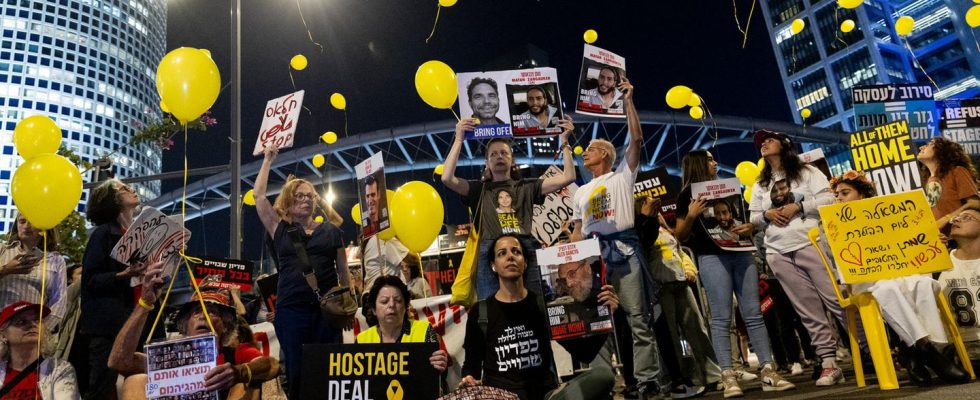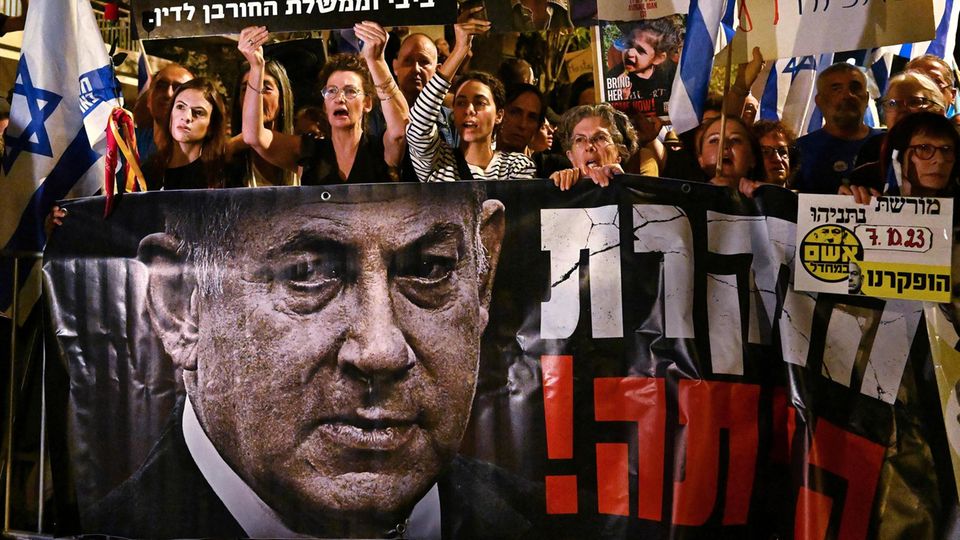Life in Tel Aviv oscillates between threats of war, missile alarms and a dinner date. Katharina Höftmann Ciobotaru speaks to the star about their everyday life, six months after the cruel Hamas attack on Israel.
How are you today, Ms. Höftmann Ciobotaru?
Well, since today the army has been jamming the GPS signal in Tel Aviv too, and now the navigation system no longer works. This is intended to make it harder for enemies to attack us. Soldiers were also recalled. Since then, there has been great fear that Iran itself could attack Israel, and not just through proxies. Since October 7th nothing has been the same. We are continually in the hot seat.
I actually wanted to start with an easy question…
Yes, I jumped right in now. But these questions concern us every day.
At the same time, you have a dinner date in an hour. How does life feel for you right now?
Since October 7th we have felt a constant fear. We have lost all sense of security. And we are afraid for the more than 100 people, our people, who are still being held. But there is also concern about the images from the Gaza Strip; it is a devastating war for the Palestinian population. And we are still threatened by Hezbollah in Lebanon or Iran-aligned militias in Syria, Iraq and Yemen.

Katharina Höftmann Ciobotaru was born in Rostock, works as an author and freelance journalist and has lived with her family for several years Tel Aviv.
© Kat Kaufmann
Is there time left to process what you experienced?
You try, while you are still being threatened and the war is going on, to mourn these 1,200 people who were murdered in the most brutal way. The attack was now six months ago. We try to keep living, keep working, take care of our children, maintain relationships with other people. It’s hard to explain what we’re going through right now because it’s all happening at the same time.
How does it feel to think that October 7th was half a year ago?
I still remember waking up in the morning and seeing the photos in the Whatsapp groups. At first no one knew what was going on. Then came the images from the kibbutz and the videos of the Hamas terrorists themselves, which they spread on social networks. It seems like yesterday that I saw pictures of young Naama Levy being dragged out of the trunk of a jeep by her hair, with blood on her crotch. I cried every day for the first few months. But it’s amazing what people can get used to. After six months I’m a little further along.
Hamas attack on Israel: “It was a crazy situation”
How did you experience that day?
It was a crazy situation for me. I was on a reading tour in Berlin, but my two children and my parents were in Tel Aviv. I woke up in the morning and had tons of messages and calls on my cell phone. My ex-husband wrote to me not to worry, he was safe with the children and my parents. But at the beginning you didn’t even know what was going on! We are used to missile alarms and have a certain amount of war experience. Even my children, absurdly so. But my parents don’t have them, they’re from Germany.
And what happened next?
Tel Aviv was completely silent. The doors were locked and the blinds were drawn. Everyone sat in bunkers; there was a rocket alarm all day long. And I was in Berlin, separated from my children and parents, completely distraught, and thought I must be freaking out with worry. But I also work as a journalist and worked straight away. On October 7th at 2 p.m. I recorded a podcast with a friend. Even on my reading trip, I didn’t talk about anything other than that day.
Middle East crisis
Hamas attacks Israel – a chronicle of events in pictures
And your family?
We flew my children and parents out via Prague two days later. Then we were in Germany for just three weeks. My children were extremely panicked, they didn’t want to go back. But this is our home. And when school starts again, the state has also decided that it is reasonably safe. So we flew back. It was a difficult decision that I had to make as a mother.
In one of your essays, I read psychologist Lihie Gilhar’s sentence: “In Israel, little time is given to mourning.” How do you manage to move on after such an experience?
The Jewish people have had to deal with attacks, pogroms and other challenges for centuries. The highest stage was of course the Shoah. That’s why in Israel there is a focus on resilience instead of trauma. The motivation for this people to continue to exist is very strong and associated with it is the feeling of community. “Now more than ever,” you say to yourself. People live more intensely here, with even more will to live. This is something very special, but it also means that there is not so much space for mourning. The families who lost loved ones on October 7th say that this suffering and the deaths are not getting enough attention.
Hamas’ goal is to wear down Israeli society.
In what way?
There was a lot of reporting about it in the beginning. This has understandably diminished and society is becoming weary as a result. But Hamas’ goal is to wear down Israeli society. That’s why they took hostages and systematically used rape as a weapon of war. The fact that we don’t know exactly who is still alive is targeted psychological terror.
How strongly do you feel this in everyday life?
We don’t have a daily routine yet. I have an everyday structure: I have children, I have to get up in the morning and take the children to school. But the constant, emotional overwhelm is still there. I also notice this in my circle of friends. We are very thin-skinned and cringe at certain noises.
It almost sounds as if the entire society has post-traumatic stress disorder.
That’s how it is, in different forms. We’re still lucky. We have our apartment, my children are fine. But many have lost relatives, hundreds of thousands had to be evacuated and are still living in hotels. There are pictures and yellow ribbons hanging everywhere that remind us of the hostages. Life can only go on when our people are back home, we have a ceasefire and agreements with our neighbors so that we can continue to live here in the future.
How do you rate the government’s policy? Last weekend saw the largest protests since the start of the war.
We are somewhere between chaos and despair. Last year there were months of protests over the planned judicial reform. I was at many demonstrations and we experienced massive police violence. The police threw stun grenades at demonstrators. Israel was already at a point where the country seemed to be falling apart. Now we have the threat from outside, a government we cannot trust and, in Benjamin Netanyahu, a prime minister whose only goal is not to lose his power. That’s why some war decisions are no longer understandable for me personally. One wonders, is this necessary? Is he doing this to prolong the war? A horrible situation.
Serious allegations. How divided is the country actually?
Before October 7th: very divided. Most agree that Netanyahu has to go. But what happens next, when there should be new elections… The country is also divided on the question of a hostage deal. A large number of people say we must do everything we can to get the hostages back. Whatever the cost. But there are also many who say, not at any price. Hostage families have now also called for new elections because they say this government is standing in the way of a ceasefire.
The growing anti-Semitism worries me greatly.
Despite all the division, all the uncertainty, is there a common denominator?
The majority of Israelis want the hostages back and Netanyahu to resign. I would also say it is clear to most people that military pressure is no longer related to a potential ceasefire. For a long time, many were of the opinion that if Hamas came under increasing pressure, they would be more willing to sign a ceasefire agreement. That was a misconception. Tens of thousands have died in Gaza, many of them women and children. Nevertheless, Hamas is not raising the white flag. That proves what kind of parallel state these terrorists have built underground.
Do you have the feeling that this ambivalence is perceived in other countries?
Oh well. The growing anti-Semitism worries me greatly. This scary monster has taken root everywhere and is attacking us from every direction. When Jewish women are raped and abused on a large scale in front of the camera, it does not lead to large women’s movements or organizations coming forward. This is shocking and very bitter.

Understandable.
I’m also disappointed that many people seem to believe that Israelis are all perpetrators. We were attacked. Now Israeli artists are being boycotted, there is anti-Semitic propaganda on social networks, death is being wished on Israelis at pro-Palestine demonstrations – and there is hardly any resistance to this. I know it’s hard to endure shades of gray. But it is an asymmetric war. Terrorists wear civilian clothes and hide in hospitals. If Hamas had its way, there should be many more victims to turn the world against Israel.
According to Hamas, more than 30,000 people in the Gaza Strip are dead.
Of course we have to talk about 30,000 deaths. We have to talk about it if there are war crimes in Gaza, and there are also investigations into that here. This won’t be swept under the rug. But Hamas still has food, weapons, sits with our hostages in safe tunnels and continues to rape our women. That gets lost in this discourse.


